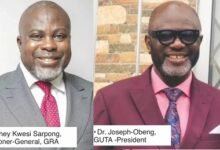‘Donate blood to save lives’

The Deputy in-charge of the Laboratory Unit of the St Joseph Hospital in Koforidua, Medical Laboratory Scientist Selina Quashie, has called on the public to debunk negative speculations that blood was for sale in hospitals in the country.
According to her, such negative speculations deterred many Ghanaians from donating to the blood banks, hence the shortage being witnessed in the hospitals which has led to death of many, especially pregnant women and accident victims.
She said what was paid was processing fee, adding that such notion was untrue and appealed to the public, especially corporate institutions to debunk it and rather donate to help save lives in the hospitals.
Ms Quashie made these statements during a blood donation exercise organised by the Koforidua Technical University and the St Joseph Hospital to encourage workers, lecturers and students to donate blood to the hospital in the municipality.
She revealed that some tribes believed donating blood would cause men to lose their manhood or that the blood were sold to “Sakawa” guys, adding that some parents of students in the second cycle institutions advised their children not to donate because of the notion.
“As we speak, we only have just 10 pints of blood, five positives, ‘O’ positives, three ‘B’ positives and two ‘A’ positives. We do not even have ‘O’ negatives, so if an emergency happens it will be difficult to save lives,” she said while she called the situation unfortunate.
The Vice Chancellor of the Koforidua Technical University, Professor David Kofi Essumang called on all tertiary institutions in the country to organise blood donation exercise to support the hospital to have enough blood for their operations, adding that the country’s maternal mortality was high due to inadequate blood at the blood banks in hospitals in the country.
He said the exercise was therefore necessary to enable the university to donate to stoke the hospital’s blood bank with enough blood and revealed that, management of KTU would organise the exercise annually to support the hospital.
BY ANITA NYARKO-YIRENKYI





